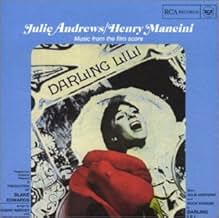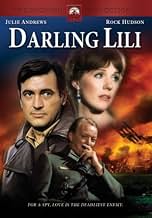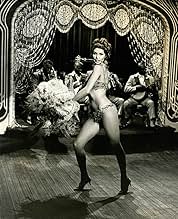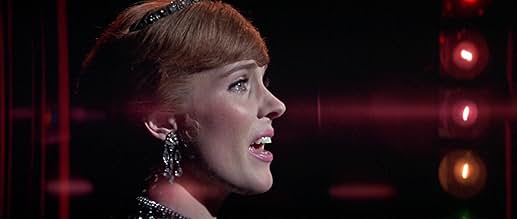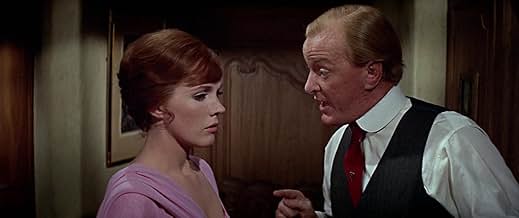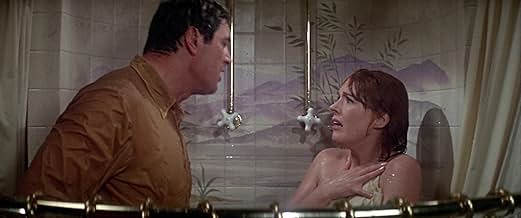Darling Lili
- 1970
- Tous publics
- 2h 16min
NOTE IMDb
6,0/10
2,6 k
MA NOTE
Se déroulant pendant la Première Guerre mondiale, ce film est une version de la légende de Mata Hari.Se déroulant pendant la Première Guerre mondiale, ce film est une version de la légende de Mata Hari.Se déroulant pendant la Première Guerre mondiale, ce film est une version de la légende de Mata Hari.
- Réalisation
- Scénario
- Casting principal
- Nommé pour 3 Oscars
- 1 victoire et 7 nominations au total
Arthur Gould-Porter
- Sergeant Wells
- (as A.E. Gould-Porter)
David Armstrong
- Squadron Pilot
- (non crédité)
Yves Barsacq
- French General
- (non crédité)
Avis à la une
I suppose I like this film as well as any I know; it is not perfect, but under the title "The Americanization of Lily" this charming and memorable semi-musical satire might I suggest have been appreciated more, and still loved by those who recognized its special Blake Edwards'-produced spirit of gentleness, clever humor and solid narrative. The improbably but delightful story-line follows Lili Smith, a fringe-type spy for the Germans in a much simpler and less black-and-white war; Lili Schmidt passing as Smith is helping her Uncle who is patriotic too, for Germany but neither cruel nor political, merely opportunistic. Lili's target is William Larrabee, a charismatic U.S. squadron leader who can supply her valuable information. The plot thickens comes when Lili falls in love with Larrabee, has her eyes opened to the consequences of her playing spy, and sees the effects of combat on wounded men at a hospital and realizes what it might mean to his men whom she has met and likes. She gets jealous of a rival for Larrabee's affections, then realizes she can no longer do what she has been doing and gives up the spy business. The logical end of the film comes when after the terrible WWI has ended, as she sings the theme song of the film, "Wishing" in a darkened theater, one by one the members of Larrabee's squadron appear, including her lover himself, indicating they have forgiven her and their former opponents; and even Uncle Kurt enthusiastically joins in the singing of "It's a Long To Tipperraree", to indicate all is well with the world again. This is an audacious and sometime brilliant story idea, written by director Blake Edwards and William Peter Blatty of "John Goldfarb" fame; and it is a delightful narrative. Larrabee's squadron, including an inebriate who keeps crashing and other lovable types populate this lively film; and the feel of this stylish and glowing film is almost epic, both in its scope and realization. Credit must go to Jack Bear and Donald Brooks for their costume creations, Reg Allen and Jack Stevens for sets, Fernando Carrere for another beautiful production design, Henry Mancini for his sensitive and appropriate musical score, and to Russell Harlan for his shining cinematography. In the beautiful footage, the principal actors are Julie Andrews as Lili, Rock Hudson as Larrabee, Keremy Kemp outstanding as Lili's Uncle Kurt, Michael Witney, Lance Percival as the inebriate pilot, gorgeous Gloria Paul as Lili's stripteasing rival, and many other fine actors in smaller parts. It is hard to say enough nice things about the pace, or the cleverness of the just-this-side-of broad comedy; this element is introduced by Edwards to leaven the horrors of actual warfare, to example the almost comic-opera approach with which men made war back in a more innocent-minded era of human civilization.. This comedy also helps prepare the way for Lili's conversion from uncritical acceptance of a duty to the German state to acceptance of the reality of what she is doing and potentially what she may be causing. This is a rare "sense-of-life" film about Lili's "Americanization", her assertion of herself in the real world and then among others before tragedy can happen. It is haunting, I find, and beautiful in many ways. I consider it to be Blake Edwards'masterpiece of directing; and under the title "The Americanization of Lili" I believe with hardly any changes it might have been recognized as the polished sapphire of a film it is by every standard I know.
Darling Lili may have been a major flop at the time, but to me it is not a bad film. Not great, uneven is a good way to describe it, but it is much better than its reputation. It is overlong, the comedy/slapstick scenes at times feel out of place and compared to the other themes that make up the film at odds with the rest of the film, the film can get muddled, the film can drag and Rock Hudson while likable is rather stiff- compared to his usual performances- and doesn't have the strongest of chemistrys with Julie Andrews(though not without its moments). Julie Andrews though is great though, her acting and presence are charming and she as ever sings like an angel. Lance Percival shines also in possibly his best film role and one of his best performances. The film looks gorgeous, the highlights being the marvellously shot aerial dogfight sequences and the visuals that accompany the song Whistling Away the Dark. The music is distinctive Henry Mancini, it fits the film adeptly and is a very memorable score and one you can re-visit more than once. Much has been said about the hauntingly beautiful Whistling Away the Dark, how Andrews sings it(like an angel and with so much nuance and emotion) and how it's staged and for good reason, simply put it's a beautiful song that is beautifully sung and beautifully staged. The script and the story aren't great but they're not disastrous either. The script is intelligent with some snappy moments, it didn't feel that talky, and the story at least has some entertainment value despite moments being muddled and the spy thriller, drama and musical themes being far more convincing than the comedy and romance ones. Overall, uneven but Darling Lili a decent film and is much better than it's made out to be, though it's somewhat easy to see why it was a flop. 6/10 Bethany Cox
It was 1970. Julie Andrews had hit her highs onscreen, and her star was starting to fade, at least in the public's eye. "Lili" represented another opportunity for Julie to change her image, coming right after the megamusical "STAR!" which didn't deserve the drubbing *it* received either.
Audiences didn't seem to care for this WWI musical drama. In fact, they were staying away in droves from ANY musical--drama or not.
The shame of it all is that this film, with its many classic moments, was stigmatized by the press who were gunning for Our Fair Julie and her new beau, writer/director/producer Blake Edwards.
But "Lili" really *is* worth seeking out. Julie sings beautifully, especially the haunting "Whistling Away the Dark," a lovely Henri Mancini tune that opens and closes the film. Her performance is nuanced and quite affecting--just watch her as a fat tear silently slides down her cheek after a tumultuous argument with Major Larabee.
Edwards has staged some stunning flight sequences, but the suffer somewhat, in 1990s sensibilities, from the blue-screen process shots needed to get Rock "into" midair. Edwards also can't seem to help himself from sliding into formulaic comedy bits (he apparently thinks a bumbling Frenchman with an umbrella on a roof in a rainstorm is hilarious--it shows up in film after film of his).
The reason to watch "Lili" is for its interesting spin on the Mata Hari legend and the performance of Miss Andrews, who certainly didn't deserve the brickbats that came her way following its release.
Audiences didn't seem to care for this WWI musical drama. In fact, they were staying away in droves from ANY musical--drama or not.
The shame of it all is that this film, with its many classic moments, was stigmatized by the press who were gunning for Our Fair Julie and her new beau, writer/director/producer Blake Edwards.
But "Lili" really *is* worth seeking out. Julie sings beautifully, especially the haunting "Whistling Away the Dark," a lovely Henri Mancini tune that opens and closes the film. Her performance is nuanced and quite affecting--just watch her as a fat tear silently slides down her cheek after a tumultuous argument with Major Larabee.
Edwards has staged some stunning flight sequences, but the suffer somewhat, in 1990s sensibilities, from the blue-screen process shots needed to get Rock "into" midair. Edwards also can't seem to help himself from sliding into formulaic comedy bits (he apparently thinks a bumbling Frenchman with an umbrella on a roof in a rainstorm is hilarious--it shows up in film after film of his).
The reason to watch "Lili" is for its interesting spin on the Mata Hari legend and the performance of Miss Andrews, who certainly didn't deserve the brickbats that came her way following its release.
Except for "Star!", (Which another reviewer understandably considers a "companion piece" to this film), Julie Andrews never starred in a film that was more ideally structured specifically for her many talents than "Darling Lilli." She gets to sing, act, look lovely, even let her hair down and do a striptease in her continuing efforts to get away from her Mary Poppins/Maria Von Trapp image, and much more. Lilli is certainly one of the most interesting characters she ever played; you're never quite sure whether you're supposed to root for or despise this half-English, half-German who is a London music-hall entertainer but also acting as a spy for the Fatherland in World War I and is sent to, um, extract military secrets from American Major William Larabee but falls in love with him and tries to clear both their names for the suspicious French government.
And like "Star!", "Darling Lilli" was released at the wrong time. It had enough "performance numbers" to count as a movie musical, even though it also had elements of drama, comedy, and spy intrigue, and both movie musicals and Julie Andrews were not what critics and audiences were anxious to see in the late 1960s and early 70s, when both films were released. So both bombed at the box office. "Darling Lilli" in particular, judging by the "director's cut" that director Blake Edwards prepared several years later, did not really deserve this fate. While flawed, it is still highly entertaining, and Miss Andrews is utterly radiant, whether acting, stripping, or singing some vintage WW I tunes or some lovely songs written for the film by Henry Mancini and Johnny Mercer. The film should be seen if for no other reason than for the hauntingly beautiful "Whistling Away the Dark" and Julie's tender, achingly vulnerable performance of it.
But as I said, the film itself is not too great. The description of Lilli's character alone is confusing enough, and often it's hard to figure out what is going on. (Perhaps some footage that could've cleared up this confusion is in the original version of the film?) In addition to the rather muddled string of events, Rock Hudson is pretty stiff as Larabee, and the various German, French, and English accents of the supporting characters come and go. The authentic WW I aircraft is cool, but the air sequences, appaarently the ones that took the longest time out of the film's very long shooting period, are the least interesting in the film. And another reviewer also noted the film's uneasy yo-yoing between genres: the "director's cut" is probably the most serious film Edwards (Who happened to have just married Miss Andrews before they started filming this) ever directed, but he can't resist putting in some of his trademark cheap laughs, although several of them are admittenly funny. And all in all, the film is very entertaining, whether as a drama, comedy, musical, or spy thriller, and whenever Julie Andrews is onscreen, all the film's faults seem like quibbles. Obviously, Mr. Edwards is in love with his wife; can you blame him?
And like "Star!", "Darling Lilli" was released at the wrong time. It had enough "performance numbers" to count as a movie musical, even though it also had elements of drama, comedy, and spy intrigue, and both movie musicals and Julie Andrews were not what critics and audiences were anxious to see in the late 1960s and early 70s, when both films were released. So both bombed at the box office. "Darling Lilli" in particular, judging by the "director's cut" that director Blake Edwards prepared several years later, did not really deserve this fate. While flawed, it is still highly entertaining, and Miss Andrews is utterly radiant, whether acting, stripping, or singing some vintage WW I tunes or some lovely songs written for the film by Henry Mancini and Johnny Mercer. The film should be seen if for no other reason than for the hauntingly beautiful "Whistling Away the Dark" and Julie's tender, achingly vulnerable performance of it.
But as I said, the film itself is not too great. The description of Lilli's character alone is confusing enough, and often it's hard to figure out what is going on. (Perhaps some footage that could've cleared up this confusion is in the original version of the film?) In addition to the rather muddled string of events, Rock Hudson is pretty stiff as Larabee, and the various German, French, and English accents of the supporting characters come and go. The authentic WW I aircraft is cool, but the air sequences, appaarently the ones that took the longest time out of the film's very long shooting period, are the least interesting in the film. And another reviewer also noted the film's uneasy yo-yoing between genres: the "director's cut" is probably the most serious film Edwards (Who happened to have just married Miss Andrews before they started filming this) ever directed, but he can't resist putting in some of his trademark cheap laughs, although several of them are admittenly funny. And all in all, the film is very entertaining, whether as a drama, comedy, musical, or spy thriller, and whenever Julie Andrews is onscreen, all the film's faults seem like quibbles. Obviously, Mr. Edwards is in love with his wife; can you blame him?
After 35 years, I've seen this film again; the 136 minute version at the Anthology Film Archives in New York City's East Village. They also showed the 114 minute version which, according to their production notes, is darker in tone, since it's missing some of the comedy of the piece. Certainly some of the cutesy comedy, which Blake Edwards, the director/producer/writer, also seems to be enamored of in his Pink Panther movies, could be cut.
The film is an attempt to make a mature, romantic musical and was a big flop at the time. Edwards was married to Julie Andrews, the female star of the movie. Andrews had a great success with "Mary Poppins" a few years earlier, and a phenomenal success with "The Sound of Music." She tried repeating the success with the awful (but, perhaps, commercially successful) "Thoroughly Modern Millie," and had a stinker with "Star!", the Gertrude Lawrence story. "Star!" was an adult musical, but it didn't take, so "Darling Lili" was another try at breaking Andrews' goody-two-shoes image. She says "ass" in the movie twice and "bastard" once! The scenes I remember most from the first screening in 1970 are the striptease by Suzette (Gloria Paul) and the aerial sequences, which are pretty dazzling (except for the obvious process shots). In fact, the whole movie is quite lavish and Andrews is gowned and bejeweled beautifully. Edwards seems to have studied the films of Vincente Minnelli and is better at creating some of the Minnellian tone than George Cukor was with the dull "My Fair Lady." In fact, Minnelli was making a movie - "On A Clear Day..." - at Paramount the same time "Darling Lili" was being produced. "...Lili" went into major cost overruns, which could account for "...Clear Day..." being so lackluster in its modern scenes, since major money was being pumped into the Andrews/Edwards film.
The movie isn't terrible. In fact, it's quite charming, if a little long. But the movie-going public is fickle, and Julie Andrews musicals fell quickly out of favor. Rock Hudson is enormously likable as always, but has little to do. The production design is delightful, and it's fun to see Andrews do her striptease (which may not be in the shorter version, and I'm thinking that must have been the version I saw in 1970, because I think I would have remembered it).
Maybe the movie will come out on DVD now that they are showing two versions in NYC. The print was beautiful, by the way. It even included the overture. The audience was a poignant collection of solitary film nerds, not excluding myself!
The film is an attempt to make a mature, romantic musical and was a big flop at the time. Edwards was married to Julie Andrews, the female star of the movie. Andrews had a great success with "Mary Poppins" a few years earlier, and a phenomenal success with "The Sound of Music." She tried repeating the success with the awful (but, perhaps, commercially successful) "Thoroughly Modern Millie," and had a stinker with "Star!", the Gertrude Lawrence story. "Star!" was an adult musical, but it didn't take, so "Darling Lili" was another try at breaking Andrews' goody-two-shoes image. She says "ass" in the movie twice and "bastard" once! The scenes I remember most from the first screening in 1970 are the striptease by Suzette (Gloria Paul) and the aerial sequences, which are pretty dazzling (except for the obvious process shots). In fact, the whole movie is quite lavish and Andrews is gowned and bejeweled beautifully. Edwards seems to have studied the films of Vincente Minnelli and is better at creating some of the Minnellian tone than George Cukor was with the dull "My Fair Lady." In fact, Minnelli was making a movie - "On A Clear Day..." - at Paramount the same time "Darling Lili" was being produced. "...Lili" went into major cost overruns, which could account for "...Clear Day..." being so lackluster in its modern scenes, since major money was being pumped into the Andrews/Edwards film.
The movie isn't terrible. In fact, it's quite charming, if a little long. But the movie-going public is fickle, and Julie Andrews musicals fell quickly out of favor. Rock Hudson is enormously likable as always, but has little to do. The production design is delightful, and it's fun to see Andrews do her striptease (which may not be in the shorter version, and I'm thinking that must have been the version I saw in 1970, because I think I would have remembered it).
Maybe the movie will come out on DVD now that they are showing two versions in NYC. The print was beautiful, by the way. It even included the overture. The audience was a poignant collection of solitary film nerds, not excluding myself!
Le saviez-vous
- AnecdotesA very troubled production, this movie went way over budget and was a box-office flop when released. Director Blake Edwards used the experience of making this movie as the inspiration for the script to S.O.B. (1981).
- GaffesIn the "Cafe Can Can" scene the World War I American pilots are said to belong to an "Eagle Squadron" but that term was only used for Americans flying with the RAF in World War II.
- Citations
Lili Smith: But then, why *does* he drink?
Maj. William Larrabee: Because he's afraid to fly.
Lili Smith: Then why does he fly?
Maj. William Larrabee: Because he likes to drink!
- Crédits fousThe Paramount Pictures logo does not appear in the beginning of the film, only at the end of the film.
- Versions alternativesTwo decades after its original release, director Blake Edwards re-cut the film for the TNT network, shortening it by 22 minutes and dramatically changing its tone. This so-called "director's cut" runs 114 minutes.
- ConnexionsFeatured in Entertainment This Week Salutes Paramount's 75th Anniversary (1987)
- Bandes originalesLa Marseillaise
by Claude Joseph Rouget de Lisle
Special French Lyrics Translations by Danielle Mauroy and Michel Legrand
Meilleurs choix
Connectez-vous pour évaluer et suivre la liste de favoris afin de recevoir des recommandations personnalisées
- How long is Darling Lili?Alimenté par Alexa
Détails
- Date de sortie
- Pays d’origine
- Langues
- Aussi connu sous le nom de
- Darling Lili: Or Where Were You the Night You Said You Shot Down Baron von Richtofen
- Lieux de tournage
- Société de production
- Voir plus de crédits d'entreprise sur IMDbPro
Box-office
- Budget
- 25 000 000 $US (estimé)
- Durée2 heures 16 minutes
- Rapport de forme
- 2.35 : 1
Contribuer à cette page
Suggérer une modification ou ajouter du contenu manquant

Lacune principale
By what name was Darling Lili (1970) officially released in India in English?
Répondre

